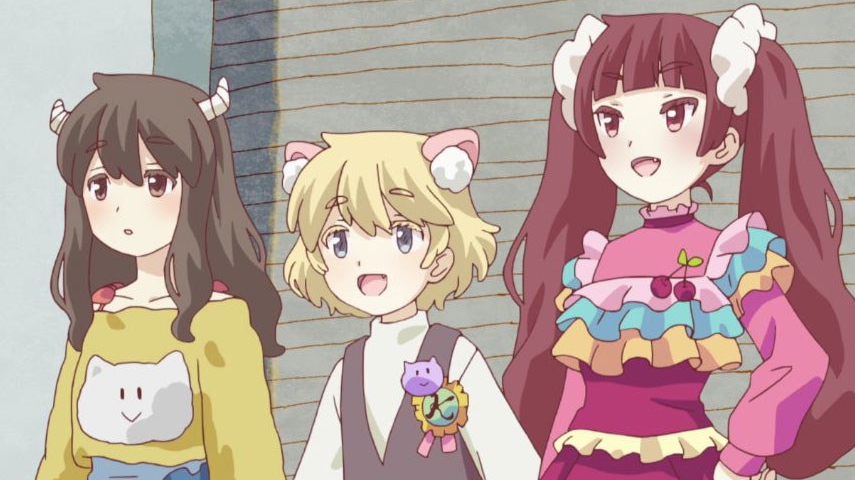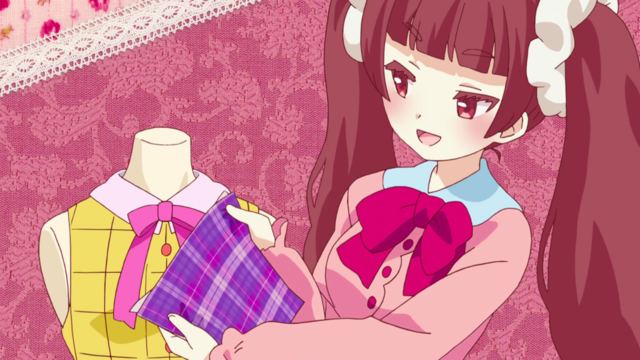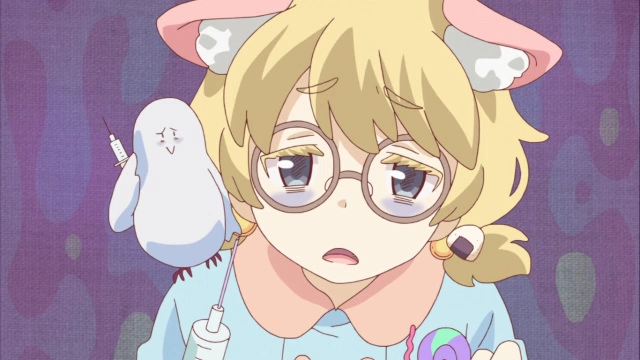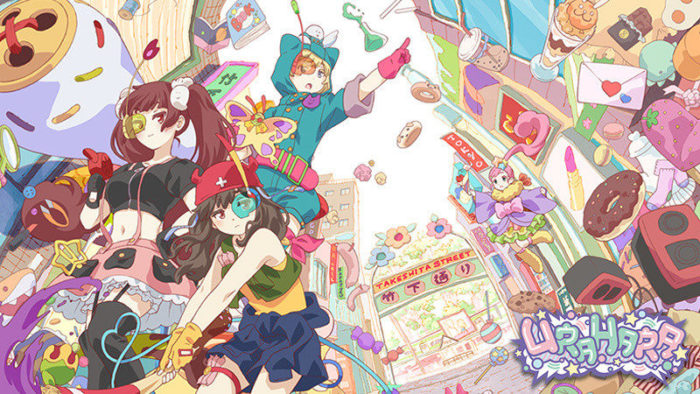“Am I really talented?” “Am I just ripping off the creators I like?” “Are my friends just saying they like my work because they’re my friends?” “Why do people only like my work when I copy current trends?” All things we will ask ourselves at least once a week, no matter how well we’re doing or how polished our work is. And then every few months, we hit a spiral. You know the one: where you don’t want to lift your pen or sit at your computer, where nothing seems right, where you cannot convince yourself you have anything good to give.
URAHARA sympathizes, too. And it’s here to tell you you’re not alone – and that your hard work is worth it.

Protectors of Harajuku
URAHARA began life as PARK: Harajuku Crisis Team!, a web manga written by Patrick Macias and illustrated by Mugi Tanaka. Based on a real fashion shop in Harajuku and starring its three mascots, URAHARA mixes a poppy pastel style with sci-fi superhero action to tell the story of three girls protecting their beloved neighborhood from an alien race called “Scoopers.”
Scoopers travel around the universe stripping planets of their most precious resource. Water? Fuel? Nope: creativity. Scoopers have no imagination and can’t create things on their own, so they make off with each world’s greatest creations. And after stripping the world of its major artistic landmarks, they’ve set their sights on the trendy Harajuku.
Fortunately, Mari (an aspiring idol), Rito (a shy artist), and Kotoko (an innovative programmer) have no intention of leaving their shop or their neighborhood behind. They’re given high-tech transformation items that allow them to turn their talents into superpowers, protecting Harajuku in a bubble and fighting off Scoopers to save the world’s art.
Or so they think.
The Creative Hitch
To know the full lengths of the deception our heroes suffer, you’ll need to watch the series for yourself (it’s available free on Crunchyroll!). But after a few episodes of creative inspiration and friendly understanding, the other shoe drops: the more they use their Harajuku-saving powers, the more the girls themselves begin to become Scoopers.
And once that kicks in, everything changes.
While the three friends work well in unison, their reactions to the revelation are (as one might expect) wildly different based on their personalities and their fields of creativity. How they cope and what they do to break free are another story for the anime to tell… but you will likely see yourself in one of their crises:

Mari: Don’t Lose the Followers
The downside of being a creator – of making things you love – is that, at some point, your work will have to be judged by others. And, to some degree, our successes as creators depend on how our creations are received.
Mari, the aspiring idol who loves the high life, lives in secret terror of her social media follower count dropping. For a 21st-century artist, that’s a legitimate fear. But just how much of a fear, and how much of our work should be steered by the social aspect, is another matter entirely.
Nonetheless, when faced with the idea of her fans “discovering” that she’s not all she claims (a big dose of impostor syndrome in action), she becomes obsessed with keeping eyes on her – not because of what she creates, but in any way possible.

Kotoko: Left Behind
The creative world, from a distance, seems strangely tiered. Observers believe that once a creative gets to a certain level, they are a different class: special and untouchable. And fellow creators, on seeing a friend achieve success, can absolutely fear getting left behind. Especially if they don’t see themselves as sufficiently talented to keep up.
Kotoko, whose strengths are in research and curating, sees her friends who create and do, and feels that she can never keep up. In her mind, her friends with their innate abilities to create will disappear far ahead in the distance. And unless she attaches herself to them, she will lose them forever.

Rito: Our Only Fans
Up-and-coming creators often build their circle of friends by finding people who appreciate their work – especially if their creations are outside the “trendy” or “norm.” Producing art for a wide audience can be difficult and emotionally exhausting, but a core group of friends who are honest and appreciative can allay that a bit.
When an audience is waning or inconsistent, fear of losing those friends becomes even more acute. Though Rito is the one who holds out the longest against the Scoopers’ words, it does hit her before long – at least in her own mind – that if her friends leave her, she may have lost the only consistent fans she has.
What Makes a “Scooper”?
We may not have aliens attacking us around every corner; but for creators, that “Scooper” anxiety really is everywhere. Are we truly creative, or are we just lifting what we like? Is our talent really a talent, or just writing about other people’s work? What happens if our friends abandon us? Is anything we do truly worthwhile?
Fortunately for us all, the show draws a line between Scoopers – those who lift and take and run off with other people’s work and call it theirs – and artists who find inspiration and support in many places. But it also acknowledges that feeling like a Scooper, even if you aren’t, doesn’t make you one. It only means you’re creative.
But, rather pleasingly, it also shows us that actual Scoopers can become creators. Not all will – some will tantrum out – but if that spark of creativity is there, it can be nurtured and grown into something beautiful.
Creative burnout and creative anxiety are, let’s be honest, somewhere in the fine print we don’t look at when we decide to become creators. We’ll hit those walls, we’ll doubt ourselves, we’ll wonder if we’re the very thing we hate – and we’ll occasionally entertain the idea of becoming said thing in order to maintain success.
But URAHARA, underneath its pop-art polka-dot cuteness, shows us that that isn’t necessary. Even if the followers aren’t there, or the work feels uncreative, or the friends aren’t responding, what matter are our actions and our creations. Those will speak for themselves.


Comments are closed.